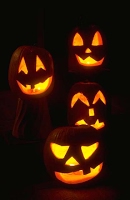Is Halloween the New Big American Holiday?
I’ve been wondering — is Halloween becoming our new biggest holiday?
 Perhaps you too have noticed that the Halloween “season” seems to be getting underway earlier — like mid-September to judge from decorations and displays in stores. And it’s no longer just the one night. It’s Halloween parties, scavenger hunts, haunted houses, costume parades and competitions for days before All Hallow’s Eve.
Perhaps you too have noticed that the Halloween “season” seems to be getting underway earlier — like mid-September to judge from decorations and displays in stores. And it’s no longer just the one night. It’s Halloween parties, scavenger hunts, haunted houses, costume parades and competitions for days before All Hallow’s Eve.
Halloween has also expanded beyond mainly kiddies trick-or-treating for candy. Lots of adult, perhaps especially young adult, Halloween activity.
If there’s any merit to these observations, what’s going on? Why the growing popularity of Halloween? And a second question — so what? What is the significance of this?
I’ve asked a handful of people if they think Halloween is growing in popularity and, if so, why?
One person thought it was because it was a “secular” holiday and so not burdened with religious content or expectations in a time when religion is associated, for many, with divisiveness.
Could be. Though it is also true that Halloween is “All Hallows Eve,” the eve of All Saints Day on November 1. So it’s not entirely free of religious associations, though perhaps those have been mostly forgotten.
Another person thought the trick or treating ritual gave people in a neighborhood a chance to interact and visit one another. This in a time when fewer people do interact with neighbors or even know them. That’s a sweet thought.
A higher brow answer to my query was someone’s observation that “Halloween is transgressive.” I think that means that Halloween allows people to cross or blur boundaries or distinctions. People can pretend to be someone else or act out some fantasy.
Then there’s the economic explanation. Have stores capitalized on an unexploited opportunity/ market? Retailers, from the drug store chains to Value Village to restaurants and bars, are pushing Halloween, making it bigger, longer, more elaborate and more expensive. Hey, let’s have fun — and spend some money.
Last year’s Halloween spending set a new record, $9.1 billion. The estimated 175 million Americans who participate spending a per person average of about $87 — $16 of that on candy. Still, compared to other holidays, Halloween is seen as low cost and affordable fun. No presents.
Halloween also lends itself to a certain amount of sexualization, in a way that is harder to imagine for the other big holidays. Maybe Halloween is picking up some of the Mardi Gras, Shrove Tuesday, wildness that characterizes Mardi Gras in other, often more historically Catholic, cultures? In some of those Mardi Gras is a multi-day “all bets (and norms) are off” time.
There’s probably something to the observation that Halloween is “secular” — without prominent religious content or associations. That in contrast Thanksgiving, Christmas and Easter — certainly the last two.
But let’s take that a little deeper. Halloween does fit with our “spiritual but not religious” age. Halloween deals in spirits, death, dark forces and magic — all “spiritual but not religious.” Or another way to put that might be to wonder if most mainstream religious groups and institutions tend to keep it “on the sunny side,” and neglect the truth and power of the darker side of life (and faith).
Halloween is not only not explicitly religious, it is also not particularly familial. With the exception of parents taking costumed tykes trick-or-treating, Halloween is a not a day when you are expected to gather with your extended family, as are Thanksgiving and Christmas. It lends itself more to non-familial and generational cohort events.
So it may that Halloween’s new popularity is another signal of weakening of both religious and familial bonds in our society.
I am enough of a Jungian to think that Halloween’s opportunity to engage the shadow (the dark and scary stuff about ourselves that we don’t normally like to acknowledge) is healthy — at least potentially. People get, if they chose, to act out fantasies and even become something or someone scary.
Of course, some would argue that all of my speculations miss the most obvious and important factor. To re-phrase a line of the Clinton advisor James Carville, “It’s about the candy, stupid.”
Or maybe that it’s just an excuse to have fun.
![Anthony B. Robinson [logo]](https://www.anthonybrobinson.com/wp-content/themes/anthonybrobinson/images/logo.png)
![Anthony B. Robinson [logo]](https://www.anthonybrobinson.com/wp-content/themes/anthonybrobinson/images/logo-print.png)